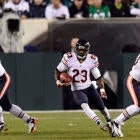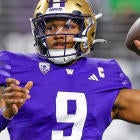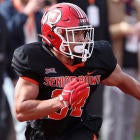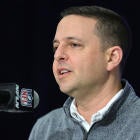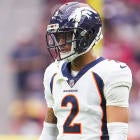The Devin Hester era is officially over. And so, the war over his Hall of Fame candidacy begins.
On Tuesday, Hester announced his retirement from football. He opened up his lengthy statement with a joke, telling NFL commissioner Roger Goodell that he can move the spot of the kickoff back to the 30-yard line now that he's no longer available to return kicks to the house. He concluded by saying, "Hopefully next time I see y'all it'll be in Canton."
CURTAINS ✌🏾 Appreciate all of the love for all these years!!! Y’all made the ride incredible!!! pic.twitter.com/jkcVrRLcNI
— Devin Hester (@D_Hest23) December 12, 2017
A debate will almost certainly open up the moment he becomes eligible, but a debate is needless. Hester is a Hall of Famer.
Hester entered the NFL as a second-round pick of the Bears in 2006. In his eight seasons in Chicago, he never morphed into a defensive back or receiver that the Bears probably envisioned when they drafted him. What he did do was terrorize opposing special teams. With the Bears, he notched 13 punt return touchdowns and five kick return touchdowns. In his rookie season, he opened up the Super Bowl with a kick return touchdown. After moving on from the Bears in 2014, he bounced around the league, making stops in Atlanta, Baltimore, and Seattle. He added another return touchdown to his tally with the Falcons. He hasn't played since a brief stint with the Seahawks last postseason. After his final game, Hester indicated that he'd likely retire. On Tuesday, he made it official.
In all, Hester retires with the NFL records for the most combined return touchdowns (20), the most punt return touchdowns (14), the most return touchdowns in a season (six), and the most ridiculous highlight reel. It might be the most ridiculous 10 minutes of film ever.
Those touchdowns and his highlight reel should be enough to get him into the Hall of Fame.
Devin Hester has officially announced his retirement from the NFL.
— ESPN Stats & Info (@ESPNStatsInfo) December 12, 2017
He has more non-offensive touchdowns than any other player in NFL history. pic.twitter.com/OEiZ7X7Vf2
The detractors will undoubtedly point to his role as a special teams player (for the record, he'll also retire with 16 receiving touchdowns and one rushing score) and argue that a player with that limited of a role shouldn't be allowed entrance into the Hall of Fame. It's an unfair argument. It's like arguing Edgar Martinez and David Ortiz shouldn't be voted into baseball's Hall of Fame because they didn't play defense.
Even when Hester wasn't scoring touchdowns, he impacted a game simply by lining up 50 or so yards downfield to return a punt. Punters lived in fear of Hester. Rather than watching him return their punts, they booted the ball out of bounds. More often than not, those punts didn't travel very far downfield. Hester swung field position by doing nothing more than standing on the field -- the equivalent of Barry Bonds getting intentionally walked. And I can't tell you how many times he nearly took a punt back to the house, only to be tackled by a shoestring.
Again, though, those touchdowns only tell a part of the story. His impact wasn't limited to special teams. He changed the game.
It’s not just about Devin Hester’s 20 return TDs. Imagine how many he would have had if teams hadn’t kicked away from him all the time. He affected all three phases because of the field position teams would give up. Players that impactful who do it 10+ years are Hall of Famers.
— Adam Hoge (@AdamHoge) December 12, 2017
Which is to say that as fun as the Hester TD montage always is, it only tells a small part of the story on how he gave opponents panic attacks every week in his prime.
— Dan Wiederer (@danwiederer) December 12, 2017
Hester's prime was spent on a Bears team that featured a championship-caliber defense and a sputtering offense. It certainly felt like those Bears teams' best chances to score came on either turnovers or punt returns. Every time an opposing team lined up to punt, Soldier Field buzzed. Every time Hester either fair caught a punt or watched the ball sail out of bounds, Soldier Field groaned. It felt like football fans were getting robbed of a chance to watch the ridiculous unfold.
No, Hester never developed into a star receiver or a shutdown cornerback. What he did do was become the greatest returner in the history of football. Hester functioned as the best player at his position for nearly a decade. That's why he belongs in the Hall of Fame.
Lovie Smith, Hester's long-time coach in Chicago, put it best.
Lovie Smith said earlier this year of Devin Hester: “Whenever you say that somebody is the best at a position in the NFL, when you say they’re the best, the greatest of all time, he should be in the Hall of Fame. For me, he should be first ballot in the Hall of Fame."
— Chris Emma (@CEmma670) December 12, 2017
For so many years, Devin Hester was ridiculous. It'd be even more ridiculous if his career didn't end in Canton.













